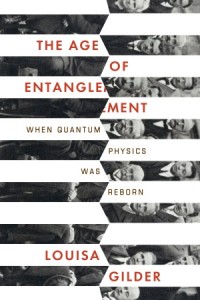 Here’s my brief Amazon review of Louisa Gilder’s new book The Age of Entanglement:
Here’s my brief Amazon review of Louisa Gilder’s new book The Age of Entanglement:
Louisa Gilder’s new book is about abstract science and the very real people who clash (and collaborate) over its truth and meaning. The Age of Entanglement is an old story with a new perspective, a dramatic new telling — and a new ending. An ending that shows Einstein was right and launches quantum physics toward its next great chapter.
All the old characters are here — Bohr, Heisenberg, Schrödinger (who coined the word “entanglement”), Pauli, Born, Dirac, de Broglie, and of course Einstein, who thought “spooky action at a distance” was implausible yet found Bohr’s entire quantum mechanical philosophy even less convincing. Unlike other tellings, however, Gilder vividly deploys their actual words from speeches, papers, letters, and memoirs to recreate the intense conversations and rancorous debates that toppled the Newtonian world. Our new understanding of entanglement, moreover, changes the very nature of the old quantum debates. Gilder’s description of Schrödinger’s epiphany that led to his wave equation is almost euphorically exciting and inspiring.
Despite the quantum revolution, big questions remained, questions that only Einstein, Schrödinger and few others had the courage to raise. And now enters the new cast — Robert Oppenheimer, John von Neumann, David Bohm, Richard Feynman, and the particle smashing Irishman John Bell, who from the early 1960s through his untimely death in 1990 showed entanglement was real. Bell is perhaps the most-important-little-known physicist, and Gilder brings the late CERN engineer-theorist to life just as his work has become the most-cited in all of physics and is breaking out across the scientific and technological frontiers.
From Vienna, Solvay, and Copenhagen to Rio, Princeton, Berkeley, Geneva, and back to Vienna, the reader is there for Bell’s intuitive breakthrough that brought the 1935 Einstein-Podolsky-Rosen paper out of laughable obscurity back to forefront of the debate (EPR argued that quantum mechanics was incomplete). And you are in the basement room where the experimentalists John Clauser and Dick Holt constructed the awkward tubular photon-counter that first proved the entanglement that years later multi-kilometer fiber-optic rings around Geneva would show with even greater precision.
Waves or particles, statistics or reality, mind or matter, information or physics, these are some of the biggest questions we know. This is the mystery of the entanglement that, although still not fully understood, is even now spawning new technologies like quantum cryptography and quantum computing and which, as you will find at the end of Gilder’s great book, somehow connects the universe across the generations.
— Bret Swanson
~~~~~~~~~~~~~~~~~
Here is Gilder (on page 242) recounting a typically rich offering from the understated but always logical John Bell:
Bell looked at Jauch as if he wasn’t quite certain the other hadn’t been making a joke. “I have a question about complementarity,” he said, in the voice of one who is changing the topic slightly. “Because it seems to me that Bohr used the word with the reverse of its usual meaning.” He grinned, tipping he head to the side. “Consider, for example, the elephant. From the front she is head, trunk, and two legs. From the back she is bottom, tail, and two legs. From the sides she is otherwise, and from the top and bottom different again. These various views are complementary in the usual sense of the word. The supplement one another, they are consistent with one another, and they are all entailed by the unifying concept `elephant.'” Bell’s hands gestured to suggest this. His eyebrows then lowered. “But Bohr, Bohr wouldn’t — it’s my impression that to suppose Bohr used the word in this ordinary way would have been regarded by him as missing his point and trivializing his thought. He seems to insist rather that we must use in our analysis elements which contradict one another, which do not add up to, or derive from, a whole. By `complementary’ he meant, it seems to me, the reverse: contradictariness.”

